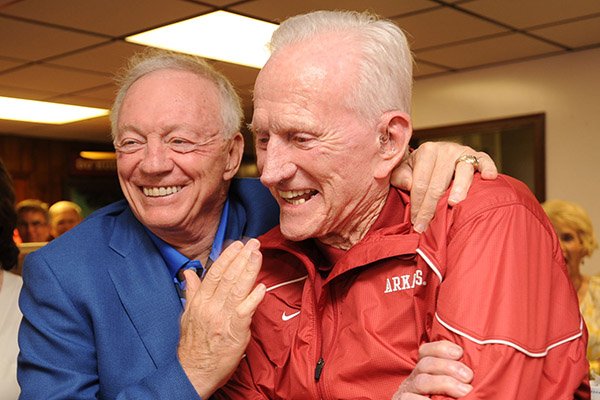FAYETTEVILLE — The tributes that poured in Monday following the death of Frank Broyles reminded that the longtime Razorbacks coach and athletics director had an influence outside the state of Arkansas.
Dallas Cowboys owner Jerry Jones, a member of Arkansas' 1964 national championship team, long has credited Broyles with his personal and professional success. On Monday, Jones called Broyles the most important man to ever live in Arkansas.
"This is an immeasurable loss of a man whose personality and presence touched millions of athletes, students, coaches and fans for more than seven decades - a man whose spirit and impact on lives will continue to be felt for generations to come," Jones said.
"Coach Broyles' name, his legacy, and spirit will continue to guide and grow collegiate athletics in this country for as long as young men and women aspire to compete and prosper from all the life lessons that athletic competition provides."
Jones' comments Monday echoed similar ones he made during his Pro Football Hall of Fame induction on Aug. 5 in Canton, Ohio, when he spoke at length about Broyles. Jones even has a statue of Broyles in his office.
"Coach Broyles was a life-changing influence for me both from a personal and professional perspective," Jones said. "He taught me, and he taught all of his players, how to be prepared for the fourth quarter, both on the field and in life.
"Outside of my father, Frank Broyles was the most influential man in my life."
Jones hired two former Arkansas players - Jimmy Johnson and Barry Switzer - as his first head coaches in Dallas. Johnson won Super Bowls in the 1992-93 seasons, and Switzer won in 1995. Both also had won national championships as college head coaches and were members - Johnson as a player; Switzer as an assistant - of the Razorbacks' national championship team in 1964.
"(Broyles) artfully shaped the early careers of so many assistant coaches who moved on to build successful programs of their own as head coaches," Jones said.
"As a coaching innovator, he introduced the I formation to the game. He brought mathematical concepts to the strategy of football by always looking for numerical advantages in blocking schemes."
Johnson credited Broyles with winning Arkansas' only national championship.
"Frank Broyles, great coach," Johnson wrote. "We were undefeated and National Champions not because of players but because of coaching."
Broyles was an influential figure on college football in Texas, too. The Razorbacks' eight Southwest Conference opponents were located in the state and Broyles' best teams featured Texans on the roster.
Arkansas and Texas met in some of college football's top games in the 1960s, meeting five times when both teams were ranked in the top 10 nationally.
Broyles orchestrated Arkansas' move away from the Southwest Conference in August 1990, but continued to emphasize the importance of recruiting the state in his later years as AD. The Razorbacks still enjoy a large alumni and fan base in Texas and play an annual game against Texas A&M at AT&T Stadium in Arlington each September.
Broyles is a member of the Southwest Conference Hall of Fame in Waco and the Cotton Bowl Hall of Fame in Dallas. He took the Razorbacks to the Cotton Bowl four times as a coach and was AD for five more Arkansas trips to the game.
"Coach Broyles will forever be remembered for his tremendous accomplishments on and off the field," said Rick Baker, Cotton Bowl Athletic Association President and CEO. "As a coach, commentator, athletics director, husband and father, few have left such a legacy.
"College football lost a giant and the Cotton Bowl lost a friend."

